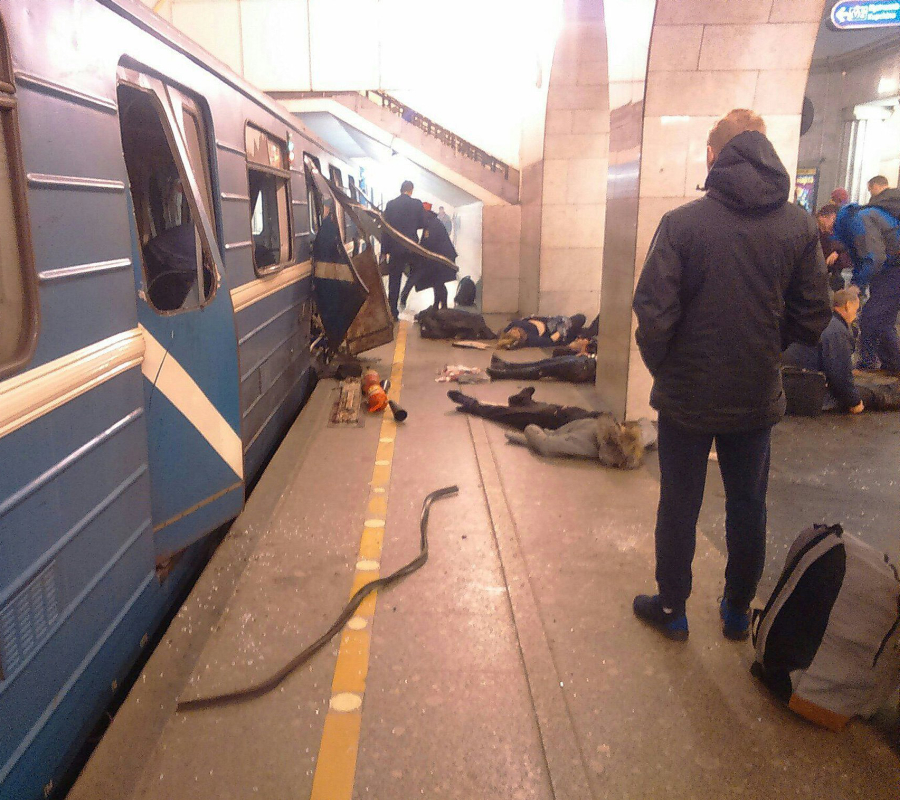A bomb explosion at St. Petersburg metro killed at least 11 people on Monday. Russian authorities believe the attack was a terrorist act, although no group has yet claimed responsibility for it. The bomb exploded on a train traveling between two central stations at St. Petersburg metro, causing the death of eleven people and injuring at least 30 others.
Russian officials said that two suspects were sought, but they did not disclose the suspects’ identities or affiliations. Authorities in St. Petersburg -which is the second largest city in Russia- searched the scene of the explosion and found a separate disarmed explosive device at another metro station. The finding led authorities to believe the attack was a possible coordinated plot, and Russia’s Investigative Committee said it’s considering the incident as a possible terrorist attack.

Security officials spread across the Sennaya Ploshchad station to look for possible suspects, and security measures around the city are being reinforced. After the blast, the St. Petersburg metro system was shut down for precaution.
An unexploded device was also found in another metro station
Russian President Vladimir Putin was in St. Petersburg at the time of the attack, as he was meeting with Belarusian leader Alexander Lukashenko, and said that all possible causes for the attack were being investigated.
Andrei Przhezdomsky, a spokesman for the National Anti-Terrorism Committee, said the explosion was caused by an unidentified explosive device placed in one of the train’s cars. The explosion occurred while the train traveled from Sennaya Ploshchad station, one of the most concurred stations in St. Petersburg metro, at around 2:40 p.m.

The operator managed to get the train to the next station, and the victims were met by authorities, according to Przhezdomsky. An amateur video shot at the scene and posted on social media, showed a large blast hole on the side of the train’s car.
The Federal Security Service from St. Petersburg released a statement saying that an unexploded device that was filled with shrapnel was discovered in the Ploshchad Vosstaniya subway station.
The Ploshchad Vosstaniya station is located at St. Petersburg’s main train station, and it is one of the central interchanges in the metro system, just like the Sennaya Ploshchad station.
“The device was defused by a bomb squad. No one was injured,” said the statement, according to the Washington Post.
The death toll could rise over the next days
Veronika Skvortsova, the Health Minister of Russia, said that seven people died at the scene of the attack, one died on the way to the hospital and two died undergoing medical procedures. She stated that six other people remained in critical condition and that the death toll could rise. Later on the day, authorities said that another person had died.

“Law enforcement agencies and the special services are working on it, and they will do everything to find out the causes of the incident and make a full assessment of what happened,” said President Vladimir Putin on national television. “Naturally, we always probe all theories, both domestic and criminal ones, primarily actions of a terrorist nature.”
Viktor Ozerov, a member of the defense and security committee of the Russian parliament, told Interfax that the St. Petersburg metro attack had all the characteristics of a terrorist act, and other Russian legislators urged for increased security measures.
No official statements regarding the investigation have been released, but Russian state-run television station Rossiya-24 reported that Russian authorities had a video of an alleged suspect entering the Sennaya Ploshchad station. A picture that has been circulating on social media is believed to be a screen grab of the alleged video, but it is unclear whether the image is legitimate.
An alleged photo of a suspect shows a Sunni Islamic man
The image shows an adult with a long beard, wearing black clothing and a kufi cap. The man is dressed in the same way as strict Sunni Islamic militants dress in the North Caucasus of southern Russia. The Islamic militants from the North Caucasus region have been blamed before for terrorist attacks in the country, ever since Russia fought civil wars in Chechnya. Russia is currently facing an insurgency from people in the Dagestan province, and last month six Russian soldiers and six militants were killed following a shootout in Chechnya.
St. Petersburg announced three days of mourning starting on Tuesday. France’s interior minister, Matthias Fekl, addressed the attack and added that security is being reinforced around Paris’ transit sites. The U.S. Embassy in Moscow expressed their condolences to the Russian people, along with other countries around the world. President Trump condemned the attack and called it “a terrible thing.”
In Moscow, dozens of people assembled outside the Kremlin and laid flowers at a World War II memorial to the city of Leningrad, which was St. Petersburg’s name at the time.
Source: The Washington Post
